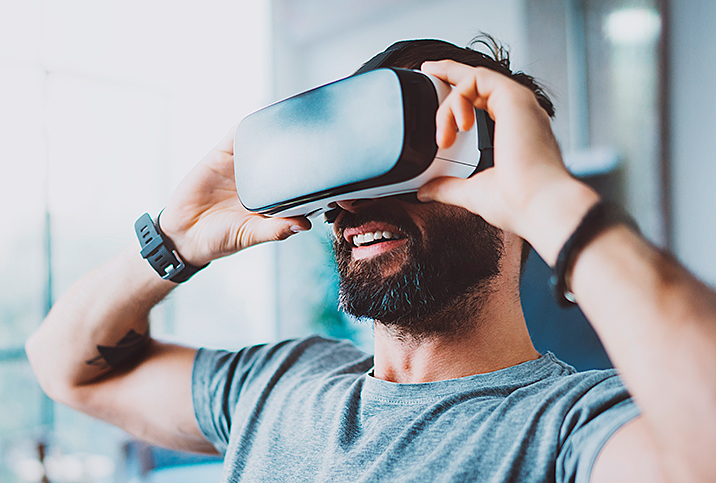Online Sex Therapy Means Help May Be Just a Click Away

Sex therapist Britney Blair, Ph.D., founder of the Clinic, Northern California's largest independent sexual health clinic, wanted to take everything she and her team does in-clinic—exercises, techniques and more—and make it accessible to anyone with a smartphone. Sex therapy from anywhere and everywhere.
It's a growing field of therapy designed for a wide variety of needs, but there are only about 900 board-certified sex therapists in the United States, and some states don't have any, Blair said.
This is a worrying statistic because 1 in 3 men have a sexual complaint, and sexual issues are among the top three reasons couples split up.
In 2020, Blair put her efforts into Lover, a sexual wellness app she views as a way to reach millions of people who need help with erectile dysfunction (ED), low desire, delayed ejaculation and other sexual health issues.
Online care is expanding with sites such as Sesame, Talkspace and ReGain giving people access to therapists and doctors from anywhere, sometimes in as little as 30 minutes.
The models may differ slightly even if the desired outcomes are the same. Lover, for example, offers text-based therapy for patients who need personalized care.
"That's the next rung of that step-care model, so people can have basically a 30-minute text-messaging session with a board-certified sex therapist," Blair explained. "And then the next level would be video medicine. After that, you would be in-clinic, and we can prescribe medications."
Pros of online therapy
Convenience is one of the major advantages of online sex therapy. Many men with ED and other sexual difficulties are busy with their careers and families. Online therapy is easier to fit into hectic schedules.
"Being able to get on the phone or a laptop and saving themselves the drive can be really helpful," said Louis Pagano, Ph.D., a clinical psychologist based in St. Cloud, Minnesota.
Pagano treats numerous clients who live in rural communities via online therapy, because for many of them, it's more than a 60-minute drive to the clinic.
Some people could be concerned online therapy is not conducive to developing a good rapport or therapeutic relationship, but Pagano explained he has yet to run into that issue.
"In my experience, that hasn't been the case," he explained. "A good internet connection with some video can be a pretty effective way to build rapport with somebody. During COVID, a lot of us have had to get used to maintaining relationships using Skype, Zoom and things like that. While initially maybe not ideal, in the long run, it's worked really well for a lot of folks."
In addition to not having to pay for gas to travel to the office, patients may save on the therapy itself, too, because some sex therapists charge a lower rate for online therapy than for in-person visits.
Michael Perry, Ph.D., a sex therapist based in Bakersfield, California, said it's possible some patients may be more open if they're willing to talk to a screen from the comfort of their home.
"Maybe somebody would be a little more open to speaking to somebody that they're not looking at face to face," he said. "They may be a little less inhibited."
Anonymity can also be a deciding factor for people seeking sex therapy, and that's a feature Blair built into the Lover app. They can create a screen name and get the same information while maintaining anonymity. Generally, online therapy gives patients more access and allows for a modicum of privacy because people do not have to come to an office.
"The privacy piece is big, convenience is huge and access is huge," Blair said. "It's also less expensive."
Cons of online therapy
One of the disadvantages of online sex therapy may arise when a therapist needs to deal with a patient physically, such as administering measurements or screening instruments. Emailing forms and questionnaires back and forth can prove tedious.
"That can be challenging sometimes if you're engaged in mental health services where you're trying to get a specific assessment done," Pagano said. "For example, maybe you need to get some neuropsychological or cognitive testing done. That will be almost all but impossible [online]."
Online therapy can become a disadvantage at its most basic level: Sometimes it's just more effective to meet with a patient in person.
Perry believes he's simply not as effective treating patients online or by phone.
"When I'm right in a room next to somebody, I can pick up clues," Perry said. "I can look at the way they're standing up or slouching, the way their face looks. I can pick up subtle clues the way I might not be able to on a Zoom meeting."
Blair feels she's not as effective online, either.
"Like 80 percent of our communication is nonverbal," she said. "There's something about being in the room where I can really make the couple feel safe and cared about and confident that I've got the skills and expertise to help them. That's much harder to do online.
"It almost feels like you're a referee, where you're really trying to slow one partner down and make another person talk," she added. "I think that that is very readily done in-office and much more difficult online when people are talking over each other."
Then there's the million-dollar question: Does online therapy work as well as in-person therapy for the patient?
The answer, at least according to Blair and Pagano, is yes.
"We do know that there are several robust studies, randomized controlled trials, that have looked at cognitive behavioral therapy online versus in person, and there's no difference in terms of efficacy," Blair explained.
Based on what he's read in medical literature, Pagano said the findings generally support online therapy being equivalent to in-person therapy.
"I would say, overall, the research is supportive of internet-based therapy for common mental health concerns like depression, anxiety, trauma," he said.




















